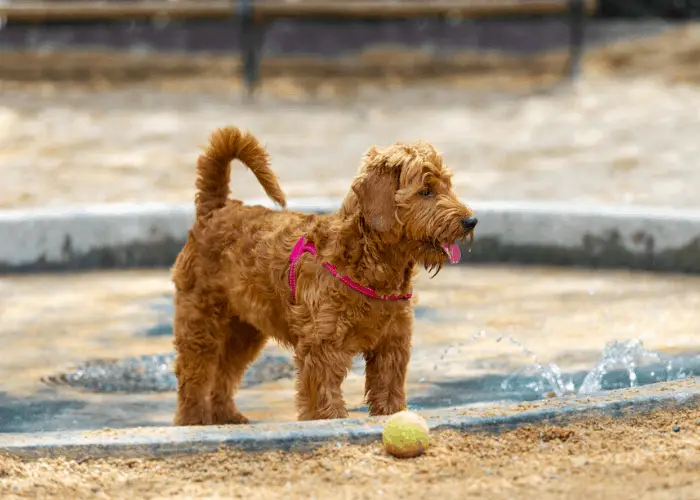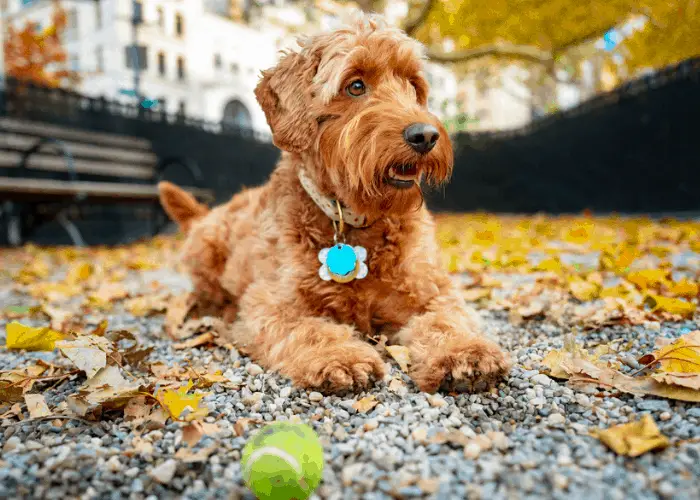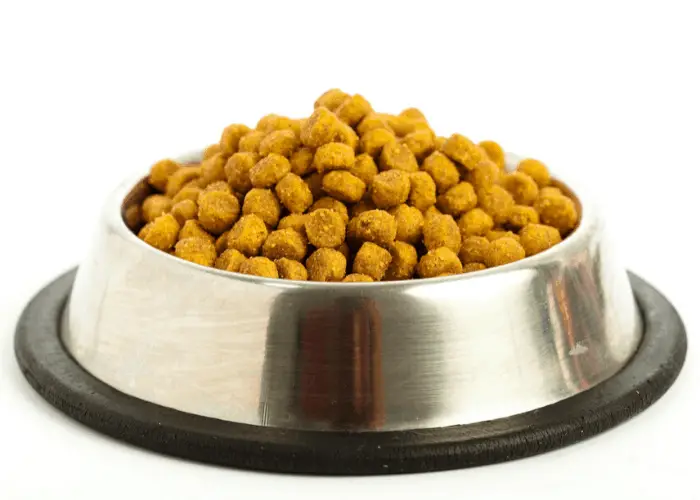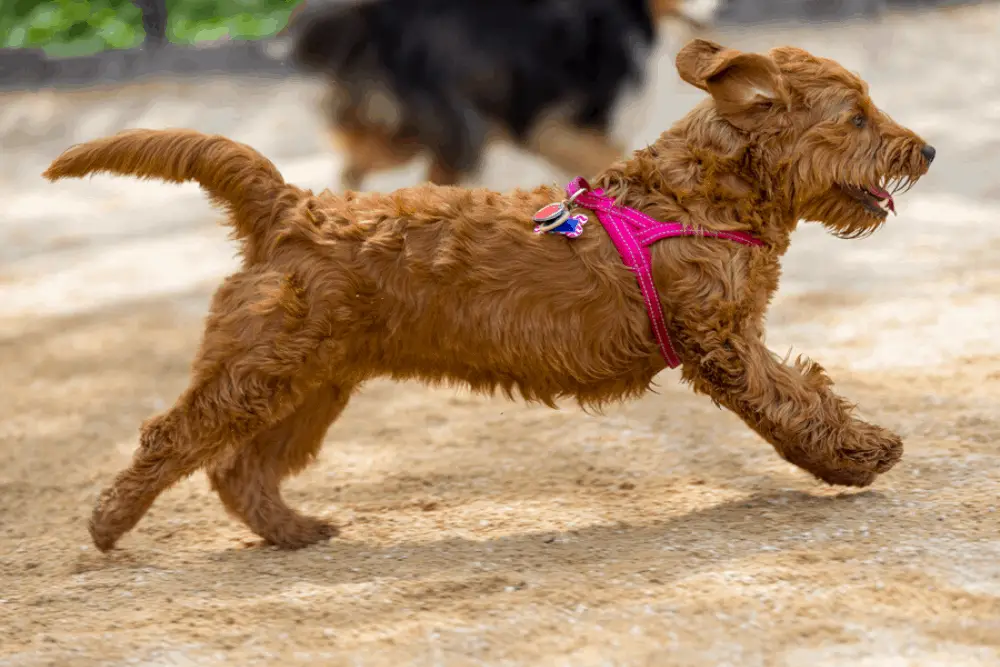A full-grown mini Goldendoodle is comparable to the perfectly sized compact car.
Small enough to fit into all the right places, and large enough to enjoy.
If you’re looking for a breed that is perfect for apartments or communities that don’t allow breeds over a certain weight or size, a Goldendoodle is an excellent choice, particularly for families.
As this four-legged friend grows in popularity, people might have some questions about the breed, its characteristics, etc…
It never hurts to ask questions to make a more educated decision, before taking the leap of being a proud owner.
In this article, we’re going to be answering all kinds of questions related to Mini Goldendoodles.
Here’s a list of the different questions we’ll be answering:
- What are Mini Goldendoodles?
- How Big is a Full-Grown Mini Goldendoodle?
- How long do Mini Goldendoodles Live?
- What is the Temperament of a Goldendoodle?
- Who Should Own a Mini Goldendoodle?
- How much Should I Feed a Mini Goldendoodle?
- How much does a Mini Goldendoodle Cost?
Before we dive into the questions, I just want to point out that you may catch me calling the breed “groodles” or “mini groodles.” This is a popular shorthand term for the breed.
They’re also referred to as “mini Goldenpoos,” but we’ll stick to the other two options for continuity’s sake.
What Are Mini Goldendoodles?

When you cross a poodle with a golden retriever, you get yourself a Goldendoodle.
When you cross a golden retriever with a toy poodle, you get yourself a mini Goldendoodle.
Just like the majority of the hundreds of different K9 breeds out there, the mini groodles are a combination of the two breeds, that have produced a generally predictable outcome when crossed, with variances depending on the parents.
You could wind up with one puppy having curlier hair, and another pup having a wavy type of coat.
Whichever side is more dominant in the gene department will determine what particular characteristics the pup is going to have.
This friendly little breed has only been around since the mid-’90s, but have been enjoying a constant uptick in popularity for a variety of reasons.
Among which are that they’re cute, great for families and single people alike, and are more hypoallergenic than other breeds- a reduced allergen risk.
How Big Is A Full-Grown Mini Goldendoodle?

The Goldendoodle Association of North America lists a set of their size range & standards that covers from petite-sized to standard-sized. Their standards go as follows:
- Petite Groodles are below 14 inches tall, and less than 25lbs.
- Mini Groodles are within 14-17 inches in height and weigh within 26-35lbs.
- Medium Range Groodles are between 17-21 inches in height and weigh within 36-50lbs.
- Regular sized Groodles are anything that falls over 21 inches and weighs over 51lbs.
Don’t forget, breeders can’t look into the future to tell you exactly how big your dog will or won’t get.
However, they do know the history and parentage of their pups if they’re reputable. This allows them to take an educated guess and is likely to gage from previous litters, what the litter your puppy of interest is going to turn out to be.
How Long Do Mini Goldendoodles Live?

Mini Goldendoodles can live anywhere from 10-15 years, depending on the overall health of the dog.
Not unlike any dog really. If your dog has a happy, healthy life, the chances are good that they’ll reach 15 years old, maybe even exceed it!
But, there is a downside to breeding pups such as this.
Mini Groodles are susceptible to a variety of different health problems inherited from their parents. This is a common problem in the world of mini hybrids.
That’s why it’s worthwhile to take your time, and find a reputable breeder that has the full history of both parents, and are transparent about any health issues that they’ve suffered.
Regular visits to the vet will greatly enhance the potential lifespan of the dog, and should anything be caught in a check-up, you’ll know what will need to be done to remedy whatever the ailment may be.
What Is The Temperament Of A Goldendoodle?

If you’re looking for your first family pet, the mini Groodle is an excellent choice and will serve you and your family well for years to come.
These dogs are extremely friendly, having been bread to take the positive characteristics from Golden Retrievers and Poodles- both of whom are a very friendly breed.
If anything, you might want to make sure that you socialize a mini Groodle as often as you can, so that it doesn’t turn into a one-person dog.
They are known to be smart, fun-loving, to have a gentle and patient nature, and are moderately active as far as mini breeds go.
Giving your dogs a lot of attention, cuddles, playtime, and some healthy daily structure is key to the mental and physical health of your dog.
There’s another great reason why a mini Goldendoodle is perfect for apartments or close-quarters living.
These are not typically a yippy dog.
It will make some noise if someone it doesn’t know comes to your door, but that’s just how they do their job- at least so they think.
Being a breed that is quick to make friends tends to have less reason to bark and yip.
Who Should Own A Mini Goldendoodle?

- This is a great first-time pet for those who have never had their own dog before.
- Families regardless of the size, or single people looking for a friend to spend their days with.
- People who don’t want to go through the rigors of training and trying to handle a large dog breed. Mini Goldendoodles are much easier to take care of.
- People who have historically denied themselves a dog due to their allergies. Mini Groodles don’t tend to shed like other breeds, and their fur is easy to groom.
- Due to their friendly and gentle nature, they make great therapy dogs and service dogs. If you have such a need, a Mini Goldendoodle will be a great choice, compared to other, less patient dogs.
These are merely a few of the different types of people that could benefit from owning a mini google.
Follow through with some due diligence before taking on any dog, so that you’re sure that you wind up with the friend that you’ve been waiting for.
How Much Should I Feed A Mini Goldendoodle?

You can imagine that due to the size of the dog, you’ll not be going through food like water.
However, it’s important to feed your puppy around 3 to 4 times a day, eating about 2/3rds of a cup per day, while gradually adjusting the amount as the dog gets older and larger.
Eventually, you’ll want to be feeding your dog anywhere between 1-4 cups daily, depending on the size of the Groodle.
You’ll have a much easier time training your dog if you structure when they’ll be eating throughout the day, and structured time to go out when possible.
This will make housebreaking much easier and more predictable- which means less clean-up work for you in the end.
Overall, they’re cheap to feed, don’t eat too much if under control, and happy with what they get!
Less food consumption makes way for buying more expensive foods for the dog, promoting a healthier overall dog and a healthier coat of that beautiful fur.
How Much Does A Mini Goldendoodle Cost?

Well, this is going to depend on the breeder, the lineage, quality of the dog, etc…
For the larger breed of Goldendoodle, you’re looking at anywhere between $900 to $2,400.
Yes, you’ll be paying dearly for this little furry friend, but it doesn’t get better as you get smaller, in fact, the price goes up.
A Mini Goldendoodle pup will run you anywhere between $1,600 and $2,600.
I know, OUCH!
However, in the end, you’ll pay several times over that for a vehicle, and chances are, your Mini Groodle will outlast the usefulness of a few vehicles that you probably paid dearly for in that amount of time.
It’s a living being, that is seeking someone to love unconditionally, and to spend time with all of its days.
How do you put a price tag on that?
People who have purchased and cared for a Mini Groodle have been happy that they did.
As aforementioned, the price will depend on the breeder, location of the breeder, the quality of the dog’s color and fur type.
Make sure to have a good long talk with a breeder, to get as much information about its upbringing and lineage as you can.
Reputable breeders just might not be willing to behave as a money grabber, or willing to do anything to make a sale.
A good and established breeder will actually care for the pups and care about what kinds of homes they’ll be living in.
They’ll even turn people down if the conditions aren’t a good fit for the pup.
Avoid breeders that are only in it for the money, and take little care for their animals.
There are plenty of them out there, and they’ll take no issue selling you a dog that will be prone to a host of different health issues.
Be wise, and as I said earlier, do your due diligence!
Back to mixed dog breeds ==>>

